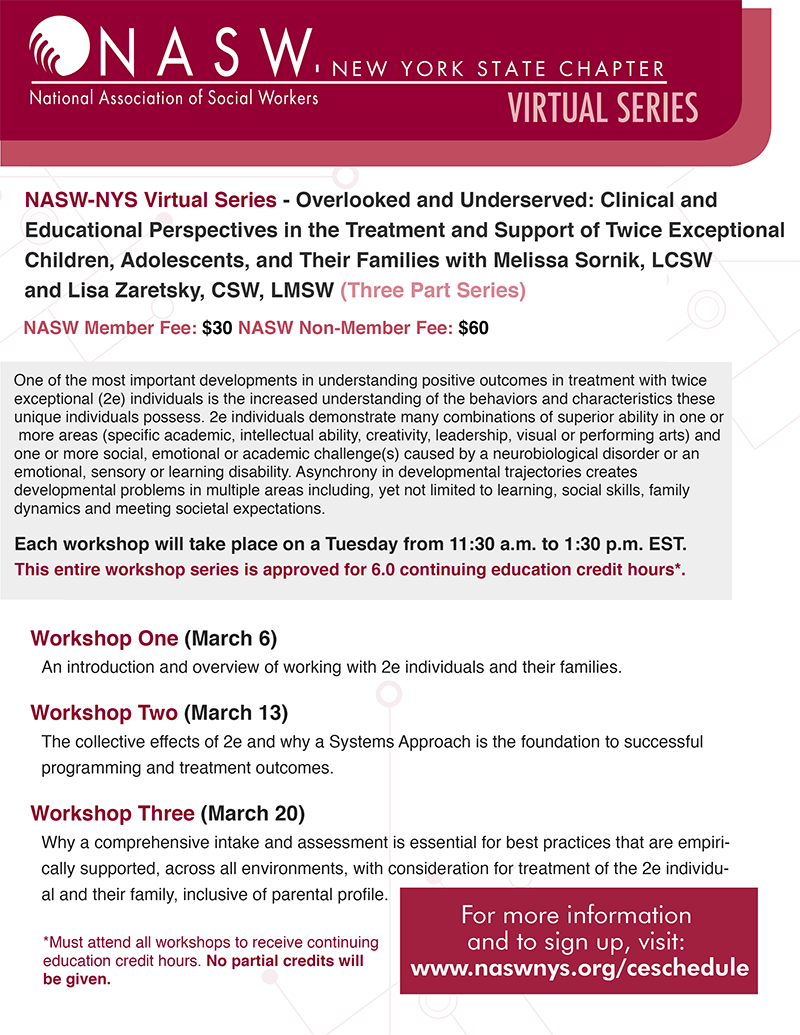
- This event has passed.
NASW-NYS Virtual Series: Overlooked and Underserved (Workshop 3)
March 20, 2018 @ 11:30 AM - 1:30 PM

Overlooked and Underserved: Clinical and Educational Perspectives In the Treatment and Support of Twice Exceptional Children, Adolescents and Their Families
Three-Part Virtual Series
March 6 ● March 13 ● March 20
11:30 a.m. to 1:30 p.m. EST
LIVE WEBINAR
NYSED Approved for 6.0 CEs
Presenter: Melissa Sornik, LCSW and Lisa Zaretsky, CSW, LMSW
NASW Members: $30 | Non-Members: $60
Workshop registrants: Please refer to the webinar instruction in your confirmation email.
Registration closes on Monday, February 5, 2018, at 5:00 p.m. EST.
This workshop is approved for NYS continuing education credit hours for licensed social workers, licensed marriage and family therapists, and licensed mental health counselors.
Workshop Description:
Must attend all three workshops to receive continuing education credit hours. No partial credits will be given.
One of the most important developments in understanding positive outcomes in treatment with twice exceptional (2e) individuals is the increased understanding of the behaviors and characteristics these unique individuals possess. 2e individuals demonstrate many combinations of superior ability in one or more areas (specific academic, intellectual ability, creativity, leadership, visual or performing arts) and one or more social, emotional or academic challenge(s) caused by a neurobiological disorder or an emotional, sensory or learning disability. Often these individuals exhibit co-morbidity and overlapping symptoms of mental health issues. Asynchrony in developmental trajectories creates developmental problems in multiple areas including, yet not limited to learning, social skills, family dynamics and meeting societal expectations. These children are at high risk for mental health problems, bullying, shame-based esteem problems and are at high risk for chronic mental health issues.
- Workshop 1 (March 6)
An introduction and overview of working with 2e individuals and their families
- Workshop 2 (March 13)
The collective effects of 2e and why a Systems Approach is the foundation to successful programming and treatment outcomes.
- Workshop 3 (March 20)
Why a comprehensive intake and assessment is essential for best practices that are empirically supported, across all environments, with consideration for treatment of the 2e individual and their family, inclusive of parental profile.
Learning Objectives:
Upon the completion of this training, participants will be able to:
- Describe how 2e individuals can be understood and the strength-based counseling and consulting approaches that promote positive outcomes.
- Learn the “why, when, how, and where” of social thinking skills and how to facilitate problem-solving with 2e individuals and their families
- Become familiar with strategies and interventions to promote healthy relationships with positive outcomes including learning how to manage the divide between the school and the family and suggestions for improving the family system and group management
Presenters:
Melissa Sornik, LCSW is the Co-founder and President of Twice Exceptional Children’s Agency, 501(c) 3 not-for-profit organization supporting special populations of gifted children and their families, both locally and nationally, through the provision of information, resources and referrals, and annual conference to promote the identification of twice exceptional (gifted with learning challenges) students, and to advocate for the development of programs and services that support their unique social,emotional and academic needs.
Lisa Zaretsky, MSW, CSW, LMSW is a seasoned and compassionate New York State (NYS) licensed social worker and educator with multiple NYS teaching certifications. Ms. Zaretsky has more than 25 years of experience in providing consultation, education, treatment, and support to twice exceptional (2e), gifted, and special needs individuals and their families. Ms. Zaretsky has significant experience in public speaking, parent education, curriculum design, and professional development, and talent for analyzing quantitative assessment data and qualitative observations to synthesize a comprehensive client profile and create therapeutic and educational programs based on empirically researched models and methods that result in positive outcomes.

